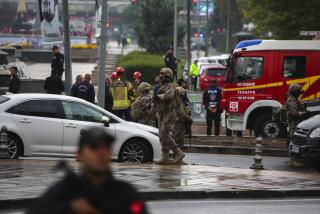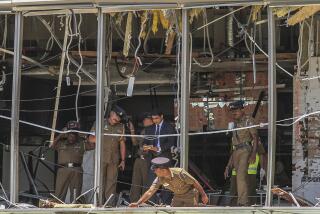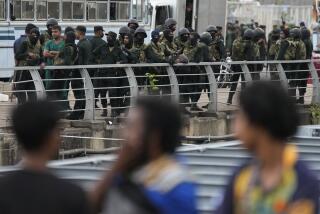Bomber Kills Sri Lankan Official
NEW DELHI — A Black Tiger suicide bomber killed more than 20 people, including a Cabinet minister, and wounded 60 bystanders Wednesday at a parade in Sri Lanka for heroes of the country’s civil war.
Witnesses said the bomber leaped from a taxi and into a procession of people in the streets of Ratmalana, a suburb of Colombo, the capital. The parade was held to raise money for War Heroes’ Day.
Industrial Development Minister C. V. Gooneratne was killed in the blast, as were the attacker and about 20 other people.
Survivors said the bomber pushed through the crowd and greeted the minister before detonating the explosives. Gooneratne was surrounded by supporters when the bomb went off.
“I heard a huge explosion and then saw parts of bodies flying around,” K. G. Karunadasa, who was at the blast, told Reuters news agency.
Police officers and army commandos scoured the area for evidence. Four men were reportedly taken into custody.
The attack was the latest atrocity in the island nation’s horrific 17-year civil war, which has killed more than 60,000 people.
The suicide attack appeared to be the work of the Liberation Tigers of Tamil Eelam, or LTTE, rebels seeking an independent homeland on a portion of this island off the southern tip of India. The civil war pits the minority population of ethnic Tamils, who are mostly Hindu, against the majority Buddhist Sinhalese.
The Tigers regularly employ male and female suicide bombers, known as Black Tigers, to strike political and military targets. And they often kill and maim civilians. In December, a Black Tiger blew herself up in an attempt to assassinate Sri Lankan President Chandrika Kumaratunga. The president survived but lost vision in her right eye.
Suicide bombers believed to be associated with the Tigers have assassinated several high-ranking politicians, including Sri Lankan President Ranasinghe Premadasa in 1993 and Indian Prime Minister Rajiv Gandhi in 1991. Gooneratne is the first Cabinet minister of Kumaratunga’s government to be assassinated.
The Tigers do not ordinarily claim responsibility for suicide attacks, and a spokesman at the group’s offices in London said Wednesday that he had no information.
Laxman Perera, acting director of information for the Sri Lankan government, said by telephone from Colombo that “this looks like a Black Tiger operation.”
The gender of the suicide bomber was not immediately known.
The attack occurred on the first War Heroes’ Day, declared by the government to honor soldiers killed in the civil war. Before the bombing, all traffic in the capital stopped and people were told to observe two minutes of silence. “This is the most sacred moment for the nation,” Kumaratunga said in a televised speech.
The government imposed a curfew in the neighborhood amid reports that mobs had begun to attack minority Tamils living in the area. The Information Department asked citizens to “stay calm at a sensitive time such as this when emotions are running high.”
The Tigers and government forces recently have engaged in ferocious fighting in the north of the country. A Tiger offensive there threatens Jaffna, viewed by Tamils as their cultural capital. The Tiger offensive has stalled in recent days, and Sri Lankan leaders say government forces have turned the tide.
A government statement Wednesday suggested that the suicide attack was an act of desperation stemming from the Tigers’ reversals at Jaffna.
“This act on War Heroes’ Day clearly shows that the LTTE, which is facing reversals in the north, is trying to provoke unrest,” it said.
Governments and organizations around the world, including the United States, Britain and the United Nations, condemned the attack. The U.S. has declared the LTTE a terrorist group for its record of killing civilians.
Philip T. Reeker, a State Department spokesman, called the attack “barbarous” and reiterated the Clinton administration’s support for a political solution to the civil war that would keep Sri Lanka intact.
More to Read
Sign up for Essential California
The most important California stories and recommendations in your inbox every morning.
You may occasionally receive promotional content from the Los Angeles Times.










